- Home
- Stephen R. Donaldson
Thomas Covenant 03: Power That Preserves Page 5
Thomas Covenant 03: Power That Preserves Read online
Page 5
Quaan shrugged.
Mhoram smiled fondly at the Warmark’s unwillingness to hazard opinions beyond his competence. “My friend,” he said, “I saw the resemblance, but could not decipher it. Ahanna daughter of Hanna aided me. Though she does not know the marrowmeld skill, she has an artist’s eye. She perceived the meaning which Elena made here.
“Quaan, the resemblance is that both ur-Lord Covenant the Unbeliever and Bannor of the Bloodguard require absolute answers to their own lives. With the Bloodguard it was their Vow. They demanded of themselves either pure, flawless service forever or no service at all. And the Unbeliever demands—”
“He demands,” Quaan said sourly, “that his world is real and ours is not.”
Another smile eased Mhoram’s somberness, then faded. “This demand for absolute answers is dangerous. Kevin, too, required either victory or destruction.”
The Warmark met Mhoram’s gaze grimly for a moment before he said, “Then do not resummon the Unbeliever. High Lord, he will lay waste the Land to preserve his ‘real’ world.”
Mhoram cocked an eyebrow at Quaan, and his crooked lips tightened. He knew that the Warmark had never trusted Covenant, yet in this time of crisis any doubt was more important, less answerable. But before he could reply, urgent knuckles pounded at his door. The tight voice of a sentry hissed, “High Lord, come swiftly! High Lord!”
Immediately Mhoram stood and moved toward the door. As he strode, he banished all his reveries, and brought his senses into focus on the ambience of Revelstone, searching it for the cause of the sentry’s distress.
Quaan, reaching the door a step ahead of him, thrust it open. Mhoram hastened out into the bright, round courtyard.
The whole high cavern of the court was clearly illuminated by the pale-yellow light which shone up through the stone floor, but Mhoram did not need to look up to any of the projecting coigns in the cavern walls to see why the sentry had called him. Lord Amatin stood in the center of the floor’s inextinguishable light. She faced him with her back to her own chambers, as if she had been on her way toward him when the distress had come upon her.
In her hands she gripped the lomillialor communication rod which the Loresraat had given to Revelstone seven years ago.
She looked like a dark shadow against the bright floor, and in her hands the High Wood burned flamelessly, like a slit opening into a furnace. Small cold balls of sparks dropped in spurts from the wood. Mhoram understood instantly that she was receiving a message from whomever it was who held the other communication rod, the one at Revelwood.
He snatched up his long, iron-heeled staff from its tripod outside his door and strode across the courtyard to Amatin. He knew from experience that the sending or receiving of lomillialor messages was an exhausting ordeal. Amatin would want his help. She was not physically strong, and knew it; when word of the Despiser’s army had reached the Lords, she had transferred to Callindrill her responsibility for Revelwood—hers because of her passionate love for lore—because she believed she lacked the sheer bodily toughness to endure prolonged strain. Yet hidden within her slight waifish frame and grave eyes was a capacity for knowledge, a devotion to study, which no other Lord could match. The High Lord had often thought that she was better equipped and less likely to uncover his secret than anyone else in the Land.
Now, silhouetted by the bright floor of the courtyard, she looked thin and frail—a mere image cast by the power in her hands. Her whole body trembled, and she held the lomillialor rod at arm’s length as if to keep it as far from herself as possible without releasing it. She started to speak before Mhoram reached her.
“Asuraka,” she gasped. “Asuraka speaks.” Her voice juddered like a branch in a high wind. “Satansfist. Fire. Fire! The tree! Ahh!” As she panted the words, she stared at Mhoram in wide dismay as if through him she could see flames chewing at the trunks of Revelwood.
Mhoram stopped within reach of the High Wood and planted his staff like a command on the floor. Pitching his voice to penetrate her transfixion, he said, “Hold fast, Amatin. I hear.”
She ducked her head, trying to avoid what she saw, and words spattered past her lips as if someone had hurled a heavy boulder into the waters of her soul. “Fire! The bark burns. The wood burns. The Stone! Leaves, roots, fibers are consumed. Callindrill fights. Fights! Screams—the warriors scream. The south hall burns! Ah, my home!”
Grimly Mhoram clenched his fist around the center of the lomillialor rod. The power of the message stung him, jolted him from head to foot, but he gripped the smooth wood and forced the strength of his will into it. Through it, he reached Amatin, steadied her; and with her support he reversed the flow of power through the High Wood for an instant. Against the flood of Asuraka’s emotion, he hissed toward her, “Flee!”
The Staff-Elder heard. Through Amatin’s lips, she cried back, “Flee? We cannot flee! Revelwood dies under us. We are surrounded. All the outer branches burn. Two trunks are aflame to their tops. Screams! Screams. Lord Callindrill stands in the viancome and fights. The central trunks burn. The net of the viancome burns. Callindrill!”
“Water!” Mhoram dashed his words at Asuraka through the communication rod. “Call the rivers! Flood the valley!”
For a moment, the pressure from Asuraka sagged, as if she had turned away from her rod. Mhoram breathed urgently, “Asuraka! Staff-Elder!” He feared that she had fallen in the fire. When she resumed her message, she felt distant, desolate.
“Lord Callindrill called the rivers—earlier. Satansfist turned the flood aside. He—the Illearth Stone—” A new note of horror came into the weak voice which shuddered between Amatin’s lips. “He resurrected the old death of Kurash Plenethor. Blasted rock and blood and bones and burned earth rose up through the ground. With old waste he walled Revelwood, and turned the water. How is it possible? Is Time broken? With one stroke of the Stone centuries of healing are rent asunder.”
Suddenly Amatin stiffened in one shrill cry: “Callindrill!”
The next instant, the lomillialor fell silent; the power dropped from it like a stricken bird. Lord Amatin staggered, almost fell to her knees. Mhoram caught her forearm to help her keep her feet.
In the abrupt silence, the courtyard felt as dead and cold as a tomb. The atmosphere flocked with echoes of anguish like the noiseless beating of black wings. Mhoram’s knuckles where he gripped his staff were strained and white.
Then Amatin shuddered, took hold of herself. The High Lord stepped back and made himself aware of the other people in the court. He could feel their presences. Quaan stood a few paces behind him, and several sentries were scattered around the rim of the shining floor. A handful of spectators watched fearfully from the railed coigns in the walls of the cavity. But the High Lord turned from them all to his left, where Corimini the Eldest of the Loresraat stood with Faer Callindrill-mate. The Eldest held each of Faer’s shoulders with an old wrinkled hand. Tears glistened under his heavy eyelids, and his long white beard quivered in grief. But Faer’s bluff face was as blank and pale as bone sculpture.
“Is he dead, then, High Lord?” she asked softly.
“Death reaps the beauty of the world,” replied Mhoram.
“He burned.”
“Satansfist is a Raver. He hates all green growing things. I was a fool to hope that Revelwood might be spared.”
“Burned,” she repeated.
“Yes, Faer.” He could find no words adequate for the ache in his heart. “He fought to preserve Revelwood.”
“High Lord, there was doubt in him—here.” She pointed to her bosom. “He forgot himself.”
Mhoram heard the truth in her voice. But he could not let her bare statement pass. “Perhaps. He did not forget the Land.”
With a low moan, Lord Amatin turned and hastened painfully back to her chambers. But Faer paid no attention to her. Without meeting Mhoram’s intent gaze, she asked, “Is it possible?”
He had no answer for that question. Instead he replied as if she
had repeated Asuraka’s cry. “The Law of Death has been broken. Who can say what is possible now?”
“Revelwood,” groaned Corimini. His voice trembled with age and sorrow. “He died bravely.”
“He forgot himself.” Faer moved out of the Eldest’s hands as if she had no use for his consolation. Turning away from the High Lord, she walked stiffly back to her rooms. After a moment, Corimini followed, blinking uselessly against his tears.
With an effort, Mhoram loosened his grip on his staff, flexed his clawed fingers.
Firmly, deliberately, he made his decision.
His lips were tight and hard as he faced Quaan. “Summon the Council,” he said as if he expected the Warmark to protest. “Invite the Lorewardens, and any of the rhadhamaerl and lillianrill who desire to come. We can no longer delay.”
Quaan did not mistake Mhoram’s tone. He saluted the High Lord crisply, and at once began shouting orders to the sentries.
Mhoram did not wait for the Warmark to finish. Taking his staff in his right hand, he strode off the bright floor and down the hallway which separated the apartments of the Lords from the rest of Revelstone. He nodded to the guards at the far end of the hall, but did not stop to answer their inquiring faces. Everybody he encountered had felt the disturbance of Revelstone’s ambience, and their eyes thronged with anxiety. But he ignored them. They would have their answers soon enough. Sternly he began to climb up through the levels of Lord’s Keep toward the Close.
Haste mounted around him as word of Asuraka’s message spread through the walls of the city. The usual busyness of life which pulsed in the rock, concerting the rhythms of the Keep’s inhabitants, gave way to an impression of focus, as if Revelstone itself were telling the people what had happened and how to respond. In this same way, the mountain rock had helped to order the lives of its denizens for generations, centuries.
Deep in his aching heart, Mhoram knew that even this rock could come to an end. In all the ages of its existence, it had never been besieged. But Lord Foul was powerful enough now. He could tear these massive walls down, reduce the Land’s last bastion to rubble. And he would begin the attempt soon.
This, at least, Callindrill had understood clearly. The time had come for desperate hazards. And the High Lord was full to bursting with the damage Satansfist had already done in his long march from Ridjeck Thome. He had chosen his own risk.
He hoped to turn the breaking of the Law of Death to the Land’s advantage.
He found himself hurrying, though he knew he would have to wait when he reached the Close. The pressure of decision impelled him. Yet when Trell hailed him from a side passage, he stopped at once, and turned to meet the approach of the big Gravelingas. Trell Atiaran-mate had claims which Mhoram could neither deny nor evade.
Trell was traditionally dressed as a Stonedownor—over his light brown pants he wore a short tunic with his family symbol, a white leaf pattern, woven into its shoulders—and he had the broad, muscular frame which characterized the people of the rock villages; but the Stonedownors were usually short, and Trell was tall. He created an impression of immense physical strength, which was only augmented by his great skill in the rhadhamaerl lore.
He approached the High Lord with his head lowered in an attitude of shyness, but Mhoram knew that it was not embarrassment which caused Trell to avoid meeting the eyes of other people. Another explanation glowered behind the thick intensity of Trell’s red and gray beard and the graveling ruddiness of his features. Involuntarily Mhoram shivered as if the wind of winter had found its way through Revelstone to his heart.
Like the other rhadhamaerl, Trell had given his whole life to the service of stone. But he had lost his wife and daughter and granddaughter because of Thomas Covenant. The simple sight of Covenant seven years ago had driven him to damage the rock of the Keep; he had gouged his fingers into the granite as if it were nothing more than stiff clay.
He avoided other people’s eyes in an effort to conceal the conflicting hate and hurt which knotted themselves within him.
He usually kept to himself, immersing himself in the stone labors of the Keep. But now he accosted the High Lord with an air of grim purpose.
He said, “You go to the Close, High Lord.” Despite the severity of his mien, his voice held an odd note of supplication.
“Yes,” Mhoram answered.
“Why?”
“Trell Atiaran-mate, you know why. You are not deaf to the Land’s need.”
Flatly Trell said, “Do not.”
Mhoram shook his head gently. “You know that I must make this attempt.”
Trell pushed this statement aside with a jerk of his shoulders, and repeated, “Do not.”
“Trell, I am High Lord of the Council of Revelstone. I must do what I can.”
“You will denounce—you will denounce the fall of Elena my daughter’s daughter.”
“Denounce?” Trell’s assertion surprised the High Lord. He cocked an eyebrow and waited for the Gravelingas to explain.
“Yes!” Trell averred. His voice sounded awkward, as if in the long, low, subterranean songs of his rhadhamaerl service he had lost his familiarity with human speech; and he looked as if he were resisting an impulse to shout. “Atiaran my wife said—she said that it is the responsibility of the living to justify the sacrifices of the dead. Otherwise their deaths have no meaning. You will undo the meaning Elena earned. You must not—approve her death.”
Mhoram heard the truth in Trell’s words. His decision might well imply an affirmation, or at least an acceptance, of Elena’s fall under Melenkurion Skyweir; and that would be bitter bread for Trell’s distress to swallow. Perhaps this explained the inchoate fear which he sensed behind Trell’s speech. But Mhoram’s duty to the Land bound him straitly. So that Trell could not mistake him, he said, “I must make this attempt.” Then he added gently, “High Lord Elena broke the Law of Death. In what way can I approve?”
Trell’s gaze moved around the walls, avoiding the face of the High Lord, and his heavy hands clutched his hips as if to prevent themselves from striking out—as if he did not trust what his hands might do if he failed to hold them down. “Do you love the Land?” he said in a thick voice. “You will destroy it.”
Then he met Mhoram’s gaze, and his sore eyes gleamed with moist fire. “It would have been better if I had”—abruptly his hands tore loose from his sides, slapped together in front of him, and his shoulders hunched like a strangler’s—“crushed Lena my own daughter at birth.”
“No!” Mhoram affirmed softly. “No.” He yearned to put his arms around Trell, to console the Gravelingas in some way. But he did not know how to untie Trell’s distress; he was unable to loosen his own secret dilemma. “Hold Peace, Trell,” he murmured. “Remember the Oath.” He could think of nothing else to say.
“Peace?” Trell echoed in ridicule or grief. He no longer seemed to see the High Lord. “Atiaran believed in Peace. There is no Peace.” Turning vaguely from Mhoram, he walked away down the side passage from which he had come.
Mhoram stared after him down the passage for a long moment. Duty and caution told him that he should have warriors assigned to watch the Gravelingas. But he could not bear to torment Trell with such an expression of distrust; that judgment might weaken the last clutch of Trell’s self-control. And he, Mhoram, had seen men and women rise to victory from anguish as bad as Trell’s.
Yet the Gravelingas had not looked like a man who could wrest new wholeness out of the ruins of his old life. Mhoram was taking a grave risk by not acting in some way. As he started again toward the Close, the weight of his responsibilities bore heavily on him. He did not feel equal to the multitude of dooms he carried.
The Lords possessed nothing of their own with which to fight the long cruel winter that fettered the Land.
He strode down a long, torch-lit corridor, climbed a spiral stairway, and approached one of the Lords’ private entrances to the Close. Outside the door, he paused to gauge the number of people who
had already gathered for the Council, and after a moment he heard Lord Amatin coming up the stair behind him. He waited for her. When she reached the landing where he stood, he saw that her eyes were red-rimmed, her forlorn mouth aggravated by tension. He was tempted to speak to her now, but he decided instead to deal with her feelings before the Council. If he were ever to reveal his secret knowledge, he would first have to prepare the ground for it. With a quiet, sympathetic smile, he opened the door for her and followed her into the Close.
From the door, he and Amatin went down the steps to the Lords’ table, which stood below the level of the tiered galleries in the high, round council hall. The hall was lit by four huge, lore-burning lillianrill torches set into the walls above the galleries, and by an open pit of graveling in the base of the Close, below and within the wide C of the table. Stone chairs for the Lords and their special guests waited around the outer edge of the table, facing in toward the open floor and the graveling pit; and at the head of the table was the high-backed seat of the High Lord.
On the floor of the Close beside the graveling pit was a round stone table with a short silver sword stabbed halfway to the hilt in its center. This was the krill of Loric, left where Covenant had driven it seven years ago. In that time, the Lords had found no way to remove it from the stone. They left it in the Close so that anyone who wished to study the krill could do so freely. But nothing had changed except the clear white gem around which the guards and haft of the two-edged blade were forged.
When Mhoram and Callindrill had returned from their plunge into Garroting Deep, they had found the gem lightless, dead. The hot fire which Covenant had set within it had gone out.

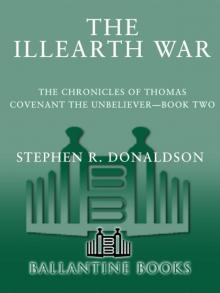 The Illearth War
The Illearth War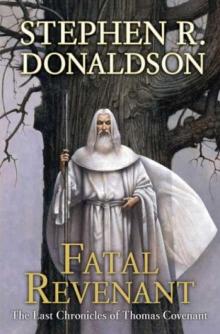 Last Chronicles of Thomas Covenant 02 - Fatal Revenant
Last Chronicles of Thomas Covenant 02 - Fatal Revenant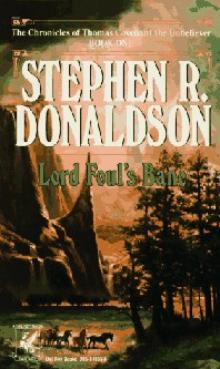 Lord Foul's Bane
Lord Foul's Bane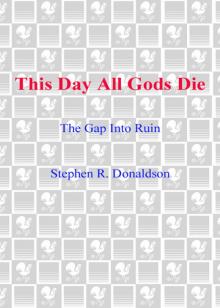 The Gap Into Ruin: This Day All Gods Die
The Gap Into Ruin: This Day All Gods Die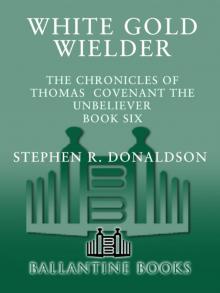 White Gold Wielder
White Gold Wielder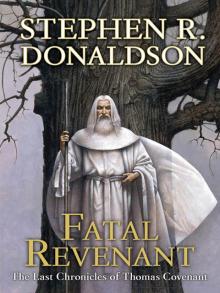 Fatal Revenant
Fatal Revenant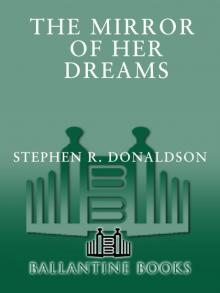 The Mirror of Her Dreams
The Mirror of Her Dreams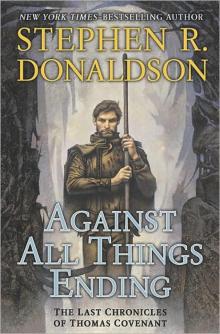 Against All Things Ending
Against All Things Ending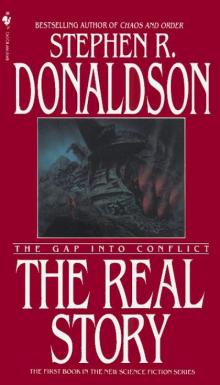 The Real Story: The Gap Into Conflict
The Real Story: The Gap Into Conflict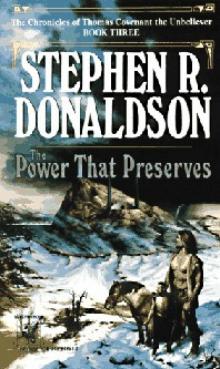 The Power That Preserves
The Power That Preserves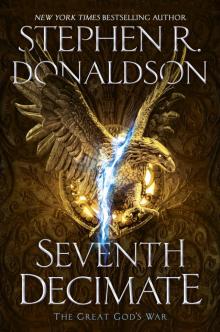 Seventh Decimate
Seventh Decimate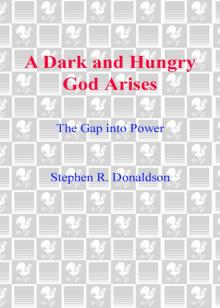 The Gap Into Power: A Dark and Hungry God Arises
The Gap Into Power: A Dark and Hungry God Arises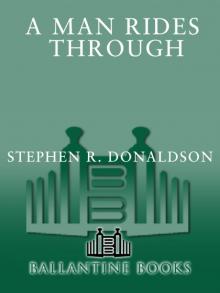 A Man Rides Through
A Man Rides Through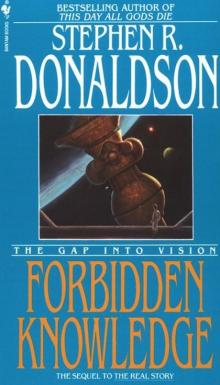 The Gap Into Vision: Forbidden Knowledge
The Gap Into Vision: Forbidden Knowledge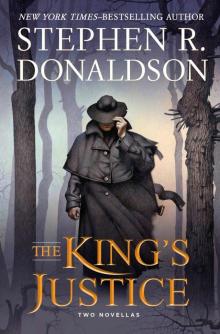 The King's Justice: Two Novellas
The King's Justice: Two Novellas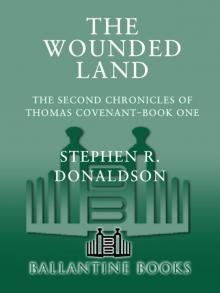 The Wounded Land
The Wounded Land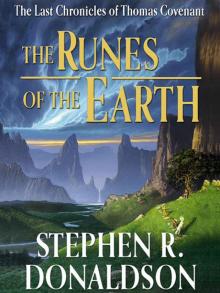 The Runes of the Earth
The Runes of the Earth Mordant's Need
Mordant's Need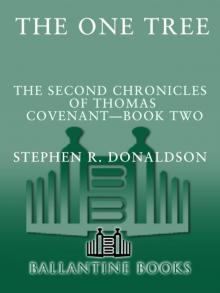 The One Tree
The One Tree Gilden-Fire
Gilden-Fire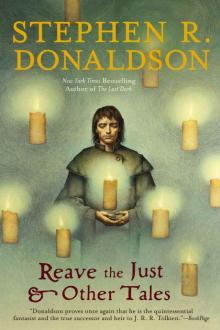 Reave the Just and Other Tales
Reave the Just and Other Tales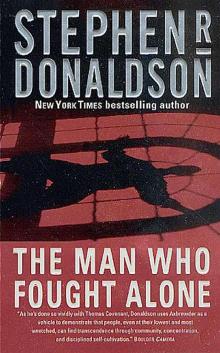 The Man Who Fought Alone
The Man Who Fought Alone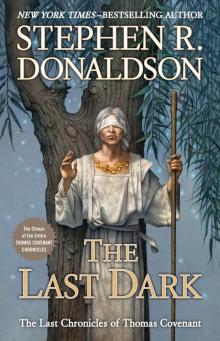 The Last Dark
The Last Dark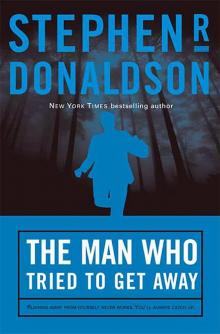 The Man Who Tried to Get Away
The Man Who Tried to Get Away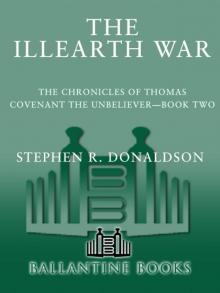 Thomas Covenant 02: The Illearth War
Thomas Covenant 02: The Illearth War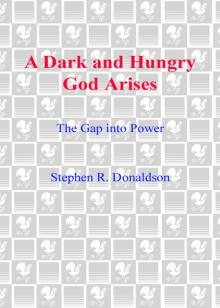 A Dark and Hungry God Arises
A Dark and Hungry God Arises The One Tree t2cotc-2
The One Tree t2cotc-2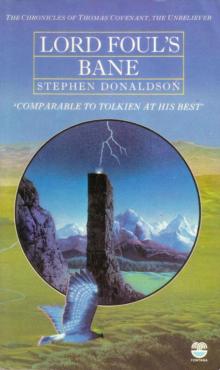 Lord Foul's Bane cotc-1
Lord Foul's Bane cotc-1 The Illearth War t1cotc-2
The Illearth War t1cotc-2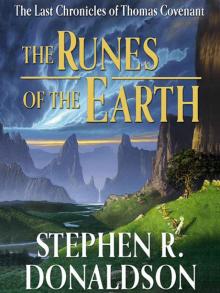 The Runes of the Earth: The Last Chronicles of Thomas Covenant - Book One
The Runes of the Earth: The Last Chronicles of Thomas Covenant - Book One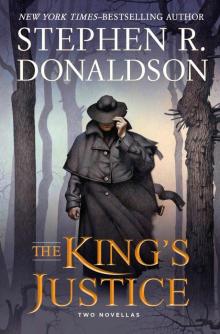 The King's Justice
The King's Justice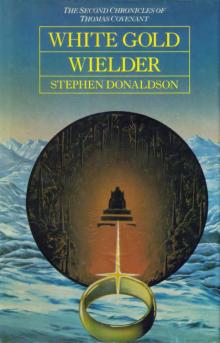 White Gold Wielder t2cotc-3
White Gold Wielder t2cotc-3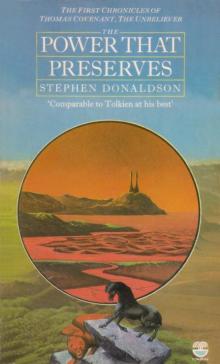 The Power That Preserves t1cotc-3
The Power That Preserves t1cotc-3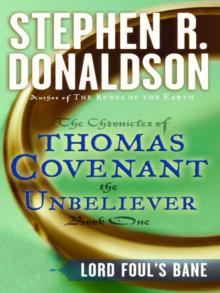 Thomas Covenant 01: Lord Foul's Bane
Thomas Covenant 01: Lord Foul's Bane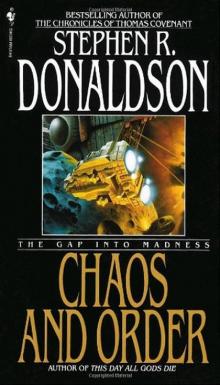 Chaos and Order: The Gap Into Madness
Chaos and Order: The Gap Into Madness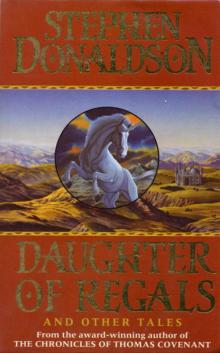 Daughter of Regals
Daughter of Regals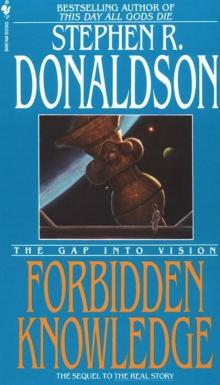 Forbidden Knowledge: The Gap Into Vision
Forbidden Knowledge: The Gap Into Vision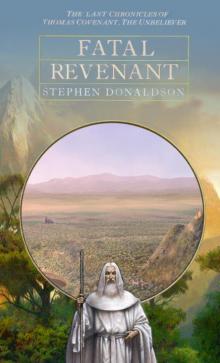 Fatal Revenant t3cotc-2
Fatal Revenant t3cotc-2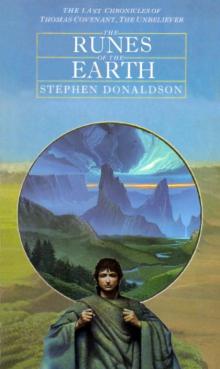 The Runes of the Earth t3cotc-1
The Runes of the Earth t3cotc-1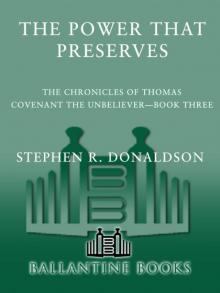 Thomas Covenant 03: Power That Preserves
Thomas Covenant 03: Power That Preserves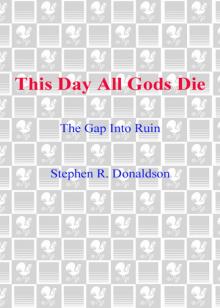 This Day all Gods Die: The Gap into Ruin
This Day all Gods Die: The Gap into Ruin The Wounded Land t2cotc-1
The Wounded Land t2cotc-1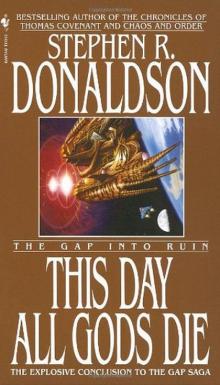 This Day All Gods Die
This Day All Gods Die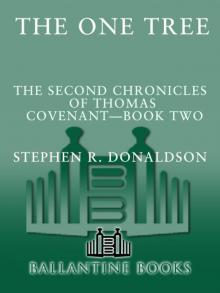 One Tree
One Tree